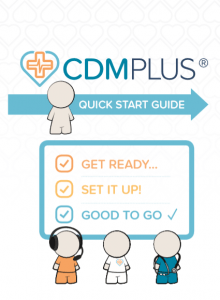
Why the first care plan is the most important
Nurses and Aboriginal Health Workers (AHWs) working in primary health care assist GPs to manage their patient’s chronic conditions every day. The patient will usually
By CDM Plus | November 30, 2023
Chronic Disease Management, like most things, was disrupted by COVID-19. Chronic Disease Management (CDM) training company CDM Plus — like many others — had to pivot when travel and face-to-face training halted.
“While health professionals on the ground also adjusted and adapted to new expectations and challenges, we wondered if rural and remote practices and their new and existing staff were coping,” said Gloria, CDM Plus Business Development Manager.
The Australian Institute of Health and Welfare [AIHW] Australia’s health 2022: in brief report explains that as COVID-19 cases peaked during the pandemic, there was a reduction in the number of CDM activities compared to previous years, as well as a reduction in important prevention and detection activities, such as mammograms (AIHW, 2022, p. 20). Timely chronic disease management is essential to minimise the physical, social, financial, and psychological impact of living with a chronic condition, particularly for priority populations such as Aboriginal and Torres Strait Islander peoples, people with a disability, older Australians, carers, and many more (Australian Health Ministers’ Advisory Council: National Strategic Framework for Chronic Conditions, 2017).
“At CDM Plus, we are committed to supporting administration and clinical staff as they face the many challenges of improving patient health outcomes. We have continued to support staff through our remote training and are excited to be back travelling Australia-wide to host workshops and onsite training,” explained Gloria.
“It was exciting to re-engage in face-to-face workshops. With almost half (47%) of Australians (AIHW, 2022) living with a chronic condition, many providers are seeking solutions to improve their chronic disease management and minimise the impact it has on patients’ health, work, home life, education, and finances,” commented Jane, CDM Plus CEO. “While many clinicians are eager to utilise CDM activities to improve health outcomes, poor patient engagement and time-poor providers pose barriers to these benefits. So, we are working with providers to implement processes and strategies that enhance patient engagement.”
“The high volume of staff changes has meant that many clinicians are often working as the only nurse or GP in their clinic and need further training to improve practice processes and feel confident to complete CDM activities such as GP Management Plans, Team Care Arrangements and Health Assessments,” said Jane. “The recent audit of the MBS item number 10997 also saw many providers wanting to double-check that their use of essential CDM billing items was correct.”
http://Chronic Disease Management in the wake of COVID-19 | Rural Health Pro

Nurses and Aboriginal Health Workers (AHWs) working in primary health care assist GPs to manage their patient’s chronic conditions every day. The patient will usually

Jane Calligeros, CEO CDM Plus Don’t you wish that everyone in your practice was on the same page when it comes to Chronic Disease Management?

CDM Plus attended the NACCHO Members Conference “Investing in What Works” in Brisbane November 2018. NACCHO is the national peak body representing 145 Aboriginal Community

This activity has been endorsed by APNA according to approved quality standards criteria. Completion of this educational activity entitles eligible participants to claim 6 CPD hours per workshop day.

10% DISCOUNT for FIRST TIME customers on purchases (excludes shipping fee).
You’ll officially be in loop for NEW arrivals,
EXCLUSIVE sales and MORE.